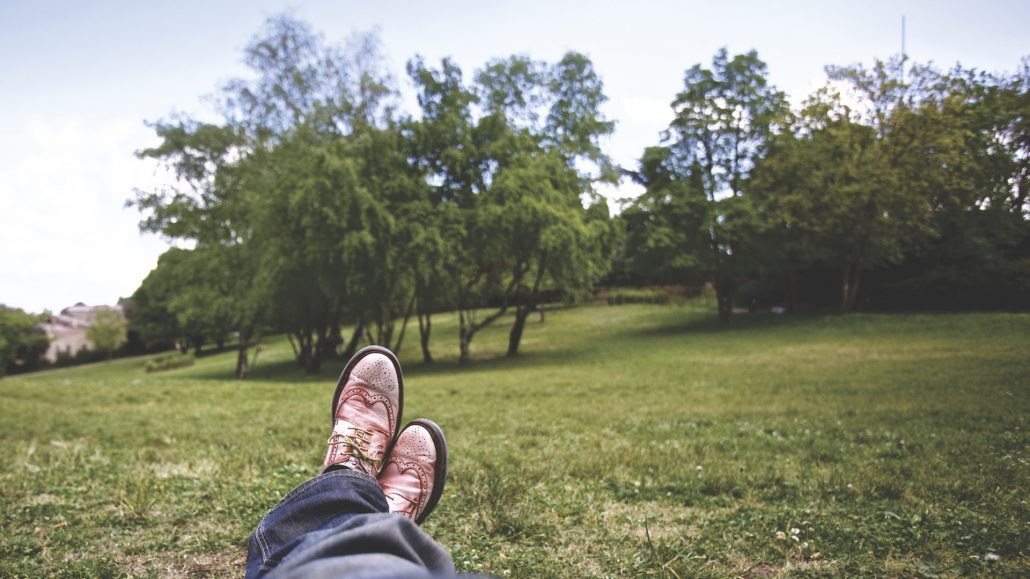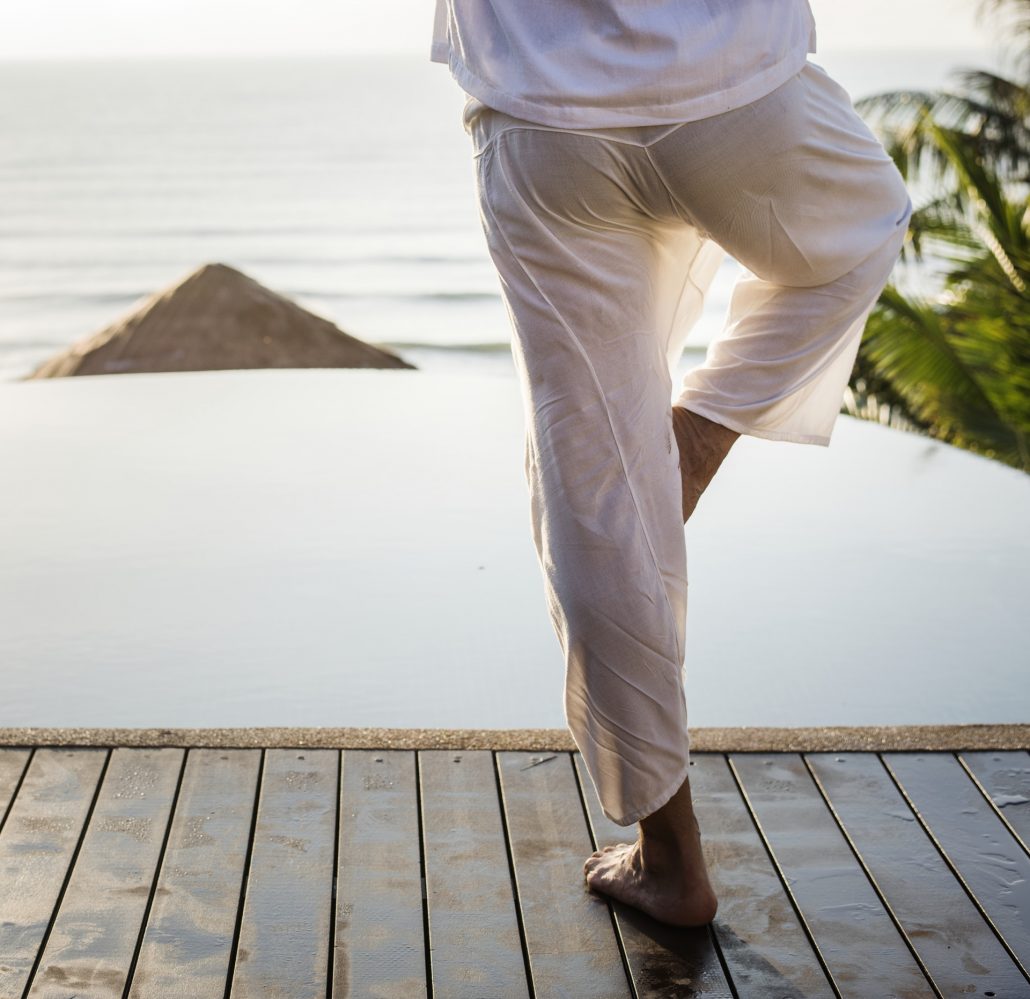Firstly, we must mention the fact that anxiety is an umbrella term for a variety of anxiety-based mental health disorders/conditions. Those with anxiety don’t all suffer in the same way. There are many different branches of anxiety, including: Social Anxiety, Panic Disorder, General Anxiety, Obsessive Compulsive Disorder, Phobias, and more.
For this reason, not everyone will cope in the same way. Here in this article, we aim to give you real, actionable methods for coping with your anxiety, but remember, not everything will work for everyone; so, try each out and see what works best for you and your needs. Above all, always consult a medical practitioner to get specific advice and guidance appropriate to your particular situation.
Mindfulness
For those of you who don’t know, Mindfulness is the awareness of the present moment. It is a state of being where you are, without thinking about anything else or being (mentally) anywhere else than exactly where you are presently.
Now, this is a massively popular idea in the Western world these days as it aids in our overall mental health. However, this is a key technique to practice especially if you suffer with any kind of anxiety disorder. Why? Because it brings you out of your head. It distracts you from your thoughts or the physical effects that your anxiety is having on your body.
It reminds us that we are safe in the moment, it is only our thoughts and feelings that are tricking us into thinking there is danger when there is none. Even if a specific event or situation has brought on the anxiety, mindfulness can still help you.
Take a moment in that time of anxiety to look around. Ask yourself: Where am I? What can I see? Smell? Hear? Feel? Taste? Use your five senses to bring awareness to the moment and breathe as you become mindfully present exactly where you are.
Active Mindfulness practices include:
- Mindful colouring (adult colouring books and apps)
- Meditation
- Breathing exercises
- Awareness activities, like: brushing your teeth, cooking, or walking whilst routinely bringing your attention back to what you can feel, smell, hear, taste, and see while doing it.
Your five senses are your bread and butter when it comes to mindfulness practices and breaking the cognitive and physical effects of anxiety.
Cognitive Behavioural Therapy (CBT)
Those who attend therapy or anxiety group sessions will typically be taught Cognitive Behavioural Therapy (CBT). The reason for this is because CBT aims to help patients with anxiety or depression to rethink and challenge their thoughts, feelings, and behaviours.
CBT is a wonderful, helpful technique used by healthcare professionals because it gives patients real tools to tackle their thinking. The techniques that are taught to individuals may depend on their personal experiences and behaviours, but in general, you will be given tips and tricks on how to better cope with your recurring thoughts and behaviours.
Therapists will often ask you to track your recurring thoughts in a Thought Diary, encouraging you to challenge negative thoughts, rate the emotions attached to those thoughts, and then put new thoughts in their place.
CBT will also bring your attention to thoughts and behaviours that are common in anxiety sufferers.
These are types of thinking like:
- Mind-reading: Believing you know what someone is thinking about you or a situation.
- Catastrophising: Thinking of the worst-case scenario or waiting for disasters.
- Personalisation: Making things about you when they aren’t.
- Negativity Bias: Subconsciously focusing on the negative and completely ignoring the positive.
- Fortune Telling: Predicting the future or an outcome of a situation ahead of time.
- ‘All or Nothing’ Thinking / ‘Black or White’ Thinking: That something (or yourself) has to be all of one thing, or else it is nothing. There is no medium.
- Labelling: Attaching labels to yourself like, “I am a failure” or “I can’t do this.”
- Overgeneralising: Reaching a conclusion about something with little to no evidence.
And, so on…
By identifying these kinds of negative thinking patterns, CBT helps those with anxiety to realise that there is a way to catch these thoughts, recognise them for what they are, and challenge them before they become toxic. Generally speaking, these techniques and labels for thinking processes help to get you to refocus your thinking. It encourages active mindset shifts.

Communication
Having any kind of mental health disorder or illness can be isolating. You feel alone and as though something is wrong with you. This is very much not the case. Many people who suffer with anxiety encounter the same or similar symptoms and experiences. The only trouble is that individuals with anxiety don’t tend to talk about it.
There is a lot of power and relief in communicating your experiences, hindrances, thoughts and feelings to others. It draws these things out of your head, and brings them into the spotlight of reality, where they are then easier to tackle. Speaking about hard feelings related to your anxiety is difficult, but as with everything else, practice makes it easier and easier each time.
Who you communicate with is up to you. As aforementioned, you may find great relief in speaking to a medical professional like a therapist or counsellor. They are licensed experts who are well-equipped to deal with patients with anxiety, which means you are likely to be understood and helped with even the hardest feelings.
However, you can also speak to those around you on a day to day basis. Your friends and family are people who care about you. If you are someone who has loved ones around you, people who you trust, then try to find the courage to be honest with them about your thoughts and feelings. It may be hard at first, and they may not understand right away, but they will in time.
As they say, “a problem shared is a problem halved” so don’t struggle and carry your worries alone. The simple act of communicating your thoughts and feelings with someone who cares can be incredibly cathartic. Trust them to help you.
If you are someone who doesn’t have people around you to talk to, you are still not alone. There are many support groups, activity groups, or chat rooms available where you can discuss your experiences with anxiety with people who have been through the same (or similar) things. A stranger is only a stranger before you say hello, so don’t dismiss them. Finding others with anxiety can be a great way to share experiences alongside coping mechanisms and techniques that can be life-changing.
The final thing to bear in mind in terms of communication is how you speak to yourself. Your relationship with yourself will be ever so important when it comes to better coping with anxiety. You need to trust yourself to get through anxious times. You need to believe that you are not your anxiety, and that it can be overcome in time. You need to tell yourself every day, and even more so when you’re anxious, that you are OK, you are safe, you will get through this, and you are not at the mercy of your anxious thoughts.
Remind yourself that they are just thoughts; let them come and go without feeding them and falling victim to their toxic cycle. Be kind to yourself. Speak to yourself the way you would speak to a friend who’s going through the same thing.
Environment Changes
Those with anxiety can often have certain things, situations, or places that trigger their symptoms. For instance, those with social anxiety may find themselves becoming anxious when out at social meals (or even simply from the invite to the meal). A good method for feeling more in control and less anxious is to remove yourself from the space you were in when you felt anxious.
This works because staying in bed, for example, where you’re feeling anxious and several sickening thoughts are whirring about in your mind, can cause the anxiety to continue. However, if you remove yourself from bed and go to another room or even outside, you are taking yourself away from the space where the anxiety struck. You are showing yourself that you are in control more than you think. Then, once you are away from that space, you can use other techniques like breathing exercises, distraction, and activity to calm yourself down further.
In a situation where anxiety crops up, like at the meal, you can do the same thing. Instead of sitting there, feeling anxious and worrying that people are watching you, you can get up and go to the bathroom. Say, “I need some air” and step outside for a moment. Hopefully, the people that you are with care about you, and so there should be no shame or worries about taking a moment to yourself before returning to the table.
Generally, it is advisable that those with anxiety make an effort to spend enough time outdoors. Anxiety and depression can be isolating disorders that keep us bed-bound, indoors, and alone. A great way to alleviate the effects of anxiety is to actively get outside in nature. Go for a walk and take in the sunshine, which will lift your mood and have many important health benefits like dopamine secretion and serotonin regulation. Sit by water or walk through the park and take in the trees and wildfire. Just as with Mindfulness, getting outside and taking a walk with no real destination will help you to be in the moment, use your five senses, and feel a state of calm come over you.

Music
Music can be your best friend if you suffer with anxiety. There are times when your head is loud with thoughts that are making you feel panicked. There are times when your thoughts make you feel alone or sad. This is where the music comes in.
Music has proven medicinal affects that can help to sooth, distract, or uplift you. Listening to your favourite pop song and having a singalong or dancing session can be a brilliant way to get out of your own head, dive deep into the music, get active, and start feeling good.
Listening to calming music like instrumentals or soothing melodies is also very helpful for those with anxiety. Allowing yourself to be emerged in the music will have natural relaxing effects. Paying close attention to the song, closing your eyes and concentrating only on the music, can be healing in times of overwhelm.
We know that particular emotions and feelings can be triggered by certain music. The craftsmanship of music is special; it is filled with heart and meaning. When we allow this to be true when we listen, we can experience the effects of music on a very potent level. This is why music is calming for so many people. In times of stress, anxiety, or panic, music can be your go-to for an instant feeling of comfort.
Distraction
We have previously mentioned this, but it is so important that is needs to be mentioned time and again. Distraction is sometimes the best method for stopping anxiety in its tracks. Oftentimes, there is no real reason to be anxious. That doesn’t mean your feelings or thoughts aren’t real for you, it just means that they serve no real need. If they are toxic, distorted, inaccurate, anxiety-inducing, or frightening, then distracting yourself from them is key.
Easier said than done, we know, but it is not impossible. With practice, you can become skilled at distracting yourself in moments of anxiety or panic. The best method for doing this is the “Stop, Breath, Distract” method. When you feel the loop coming on, and the thoughts and feelings are overwhelming you, say Stop to yourself, take a deep, mindful breath, and then proceed to distracting yourself.
Don’t give more time and energy to the thoughts once you’ve done this. Remember what we said before: thoughts are just thoughts, let them come and go without giving in to them. Catch the loop of toxic thoughts that make your feel anxious by recognising that you’re feeling badly on a physical level due to the thoughts. From there you need to distract yourself in the way that best suits you – this will take some trial and error; practice makes perfect.
Some ideas for distraction:
- Activity or exercise
- Going for a walk
- Reading
- Listening to music
- Speaking with someone
- Being creative: drawing, colouring, writing, designing, etc.
- Chores and housework
You can choose to do something fun or relaxing (like watching a film or television show), but in moments of high anxiety, try to do something that engages you in an activity and requires your full attention.
Breathing
It may sound simple, or silly, but breathing is important for those with anxiety. Think about it, in times of high anxiety, stress, panic, or overwhelm, the chest becomes tight. You struggle to breathe. Therefore, if you can get used to using your breath as a tool, you will be able to fight these physical effects that come from anxiety.
It is important for you to learn to breathe intentionally, mindfully, and steadily when anxiety comes over you. Our breath can stop the thoughts, slow down the physical affects, and bring us back to the now and a feeling of safety and control over the Self. Lack of control, or the feeling of being out of control, is what can make us anxious. If we can control the breath, not only are we slowing the heart rate, but we are also demonstrating to ourselves that we do, in fact, have control over ourselves.
You can learn set breathing exercises, which usually incorporate counting in a sequence, or you can follow a meditative breathing guide – which will be further explained in the following method.
Yoga and Meditation
Yoga and Meditation are not for everyone, but we encourage those with anxiety to give them a try at least a few times before pushing them aside. Achieving a state of calm and knowing how to do so is fundamental for anxiety sufferers. To know that you have a go-to practice that soothes you can ensure that you feel more in control of your anxiety and its effects.
Yoga practices and meditation exercises can be the state of calm that brings you joy, makes you less tense and stressed, and slows you down enough to relax and sooth the anxious thoughts.
Don’t worry, you needn’t be an expert. You don’t need to be flexible to do yoga and you don’t need to be able to completely empty the mind in order to meditate, either. Instead, start from the beginning. Go to a class, watch videos online, or find information in books and tutorials. Use the wealth of information out there available to us to help get you started.
Being a beginner is OK. It’s OK to feel odd or sceptical at first. But give it a wholehearted try and you just might surprise yourself. Yoga and meditation are scientifically proven to relieve tension, ease stress, and give relief from anxiety. In time, they could become an important and routine part of your life, helping you to connect your mind and body, control the breath, and achieve a state of calm outside of the anxiety.

Activity
It is known that anxiety can develop from bored, inactive, or overactive minds. This means that if you are an active person, you may experience less anxious thoughts because your brain is busy doing something other than thinking.
Evolutionary psychologists attribute the rise in anxiety sufferers to the fact that we as a society are less active than ever. Back in caveman times, we correctly used our “anxiety” as a defence mechanism. The Fight-or-Flight response (driven by adrenaline) to danger helped us to avoid being eaten or attacked back then. But now, there are no sabre-tooth tigers after us, and so our brains look for danger in other places, leading to unwarranted anxiety.
Due to the fact that many of us have inactive office jobs, our bodies are dormant, and our minds tend to wonder. Boredom, fatigue, mundane routines, or low activity in your life can all cause anxiety to rear its ugly head and start to conjure up “problems” and “danger” where there isn’t any. Our minds like to be busy, or challenged, or engaged, so if they’re not, they will fill in the blanks for us and it’s often not good.
How to combat this is to ensure that you are active. Live with intention, productivity, and purpose. Of course, this isn’t easy, and it may seem overwhelming, but it’s not as hard as it sounds. Instead of sitting on social media or watching television, go for a walk or read a book. Do something that is good for your brain and keeps it occupied. While you work, listen to music or a podcast. As you travel or are doing mundane tasks, listen to an audiobook.
On the other hand, if you are someone who is incredibly busy with a million things to do in your week, you will be a prime candidate as someone who needs to incorporate periods of calm in your day. This is where relaxing, slow-paced activities come in like: Mindfulness, meditation, yoga, or reading (for entertainment, rather than education, ideally).
Finding the right balance of activities is important for everyone, but it is even more important for those with anxiety of any kind. Your mind will fill with negative thoughts and toxic loop cycles if you aren’t aware of yourself, your behaviours and your feelings. Don’t allow yourself to be too inactive, and don’t allow yourself to be too busy. Inactivity leads to a bored mind that looks for danger; overactivity leads to a stressed mind that bends and breaks, leading to anxiety.
Bonus Tips and Advice
- Acupuncture and Massage: These East Asian practices may have some benefit in relieving tension and relaxing the body and mind quickly.
- Acceptance: Running from anxiety will only make it chase you more; accept that it’s there but detach from it, as it is not who you are.
- Sleep and Diet: Paying attention to your sleep hygiene and routine, alongside your diet, is important for relief from anxiety. Some foods can lead to anxiety. High amounts of caffeine can spur it on, too. Ensure you have a balanced diet and a good amount of sleep each night to rule them out as causes for your anxiety.
- Journaling: As with CBT practices, you can write a journal for yourself on a regular basis, taking time to get all your thoughts onto paper. Sometimes just writing about how you feel or what experiences you’ve had can help with perspective, acceptance, new thinking, and relief.
- Gratitude and Perspective: Practicing gratitude is incredibly healing. Gratitude encourages you to focus on what you have rather than what you lack. It puts your life into perspective, pushes aside bad thoughts, and can bring on a state of calm and true focus.
- Honesty: Being honest with yourself is not easy, but it is important. Ask yourself why you feel anxious. Ask yourself if you have any real reason to be. Recognise the anxiety versus the truth, and you can become better at regaining calm when anxiety comes knocking.
Thankfully, there are a great many ways that you can get relief from anxiety symptoms. As we said in the beginning, not everyone will experience anxiety in the same way but these methods for coping with anxiety are tried and tested techniques for bringing back the calm and regaining control.
Some are active techniques that you should try to make routine in your everyday life, in order to gain overall mental health benefits. Some of the others will be most useful in the moments when anxiety strikes. Either way, remind yourself that you are in control and you can overcome anxious episodes.
You can do this.



